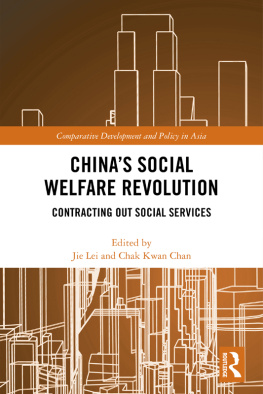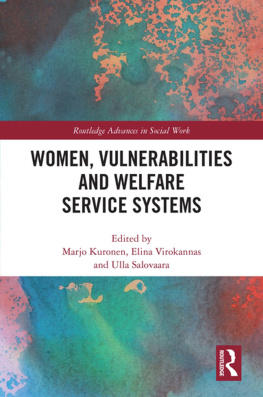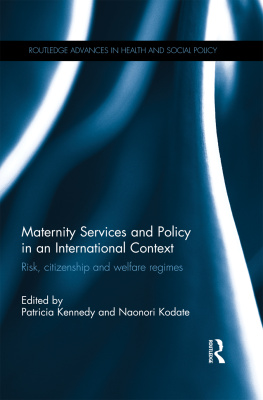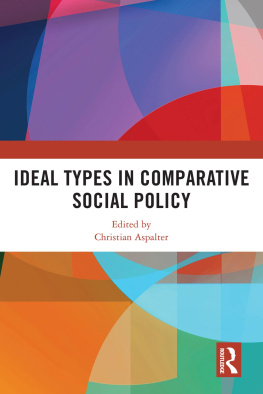Keith Pringle 1995
This book is copyright under the Berne Convention.
No reproduction without permission.
All rights reserved.
First published in 1995 by UCL Press
Reprinted 2003 by Routledge
11 New Fetter Lane
London, EC4P 4EE
Routledge is an imprint of the Taylor & Francis Group
British Library Cataloguing in Publication Data
A CIP record for this book is available from the British Library.
Library of Congress Cataloging-in-Publication data are available.
ISBNs:
1-85728-401-1 HB
1-85728-402-X PB
978-1-134-22157-8 EPUB
Typeset in Palatino.
Printed and bound by Antony Rowe Ltd, Eastbourne
To my mother and father
This study deliberately focuses on men who are welfare workers and men who are service users because they have remained shadowy figures in previous welfare literature.
It is not designed to be a handbook of practice for welfare workers who are men. Many issues need to be debated, many questions need to be asked about both men and welfare before anyone is in a position to write such a handbook on this subject.
However, the alternative is not inaction. We can act and seek to find our way at the same time. Consequently, my aim is to examine critically the concept of masculinities and the nature of social welfare services. From that critical analysis I hope I provide a framework within which men who are welfare workers and men who are service users can seek to challenge and transform the relations of power that structure forms of oppression inside and outside social welfare organizations. In this project, such men have both a particular responsibility and a particular role to play. For the power relations referred to above are associated with the ascendancy of certain forms of masculinity.
This study tries to provide a preliminary map of the different levels of activity at which men may seek to engage with that project of challenge and transformation. The levels extend from, at one end, each of us working to develop the range of our own masculinities to, at the other end, seeking societal change. We men who are involved with welfare, as workers or users or both, can and must collectively engage at those two levels and all points in between. We must do this, first of all, for the sake of people who are oppressed: children, women, men. We must also do it for our own sakes.
Many people have helped me to think through these issues over the years. For those I do not mention specifically I say thanks to you now.
Of those I do mention, I would like to acknowledge my colleagues at the University of Sunderland for assisting me to take time out for a research secondment, part of which was spent on this book. I have also been grateful to Justin Vaughan at UCL Press for staying with the project through various difficulties and for his guidance; also to Sheila Knight for her tolerance.
I have benefited greatly from conversations with Mark Liddle, Patrick Price, Trefor Lloyd, Malcolm Holt and June Turnbull in the United Kingdom; with Margareta Bck-Wiklund and Sven-Axel Mnsson from Sweden; and with Petra Gieseke and Elke Joennsen from Germany.
To the members of People Against Child Sexual Abuse ( PACSA ), I am so grateful for what they have taught me, and are still teaching me. Several friends are owed a lot: Marietta, Sharon, Diane, Marjorie, Douglas, Malcolm, Loura, Shahida, Jeanette, Dave and Berni. Of the humans, the people to whom I owe the most in relation to this book are those friends with whom I have travelled at different times in confronting the violences of men: Barbara, Edna, Liz and Shelagh. Of the non-humans, thanks to Daisy and Tigger who kept me company through many late nights and shared their love unconditionally.
Naturally, I alone bear responsibility for what is written in the pages that follow.
While this book was in production, I learnt about the tragic death of Franki Raffles, who played a central role in Edinburghs Zero Tolerance Campaign. I will not be alone in remembering her energy, creativity, determination, sensitivity and warmth of personality.
Men talking about masculinities
Introduction
The aim of this study is to consider the situation of men in the field of social welfare: men who work there and men who use the services it provides. My approach is explicitly anti-sexist and anti-oppressive. I hope this study will make a contribution to the process by which men can seek to work together to counter oppressions associated with dominant forms of masculinity as well as to develop ways by which men can express themselves and relate to other human beings more creatively.
My main geographical focus is on the United Kingdom, although many of the debates are common to what we might term the Western societies and some of the evidence we shall use comes from outside this country, and in particular from the United States.
Thematically, my focus is on social welfare, which is admittedly a rather amorphous concept. By social welfare I refer to those systems of service provision whose ostensible aim is to promote social wellbeing and alleviate social distress. In practice that means statutory and voluntary agencies in fields such as social services/social work, health, community work, youth work, education, housing, social security, employment. Some of these fields are, of course, more central to issues of social welfare than others and therefore warrant more attention. However, they all feature at some point in this study as do agencies in other fields that can impinge on the social welfare of human beings such as the law and the police. It is my contention that men need to forge alliances across the welfare worker/service user divide, as well as within those categories, if their anti-oppressive activities in social welfare are to be successful. However, such alliances have limitations placed upon them by the overarching nature of patriarchal relations and other forms of domination in which they must be forged.
Power and domination enter into all issues relating to being a man in our society and that includes the situation of a man writing about men and masculinities. So before we try to clarify the situation of men and social welfare, we first need to clarify some questions about the practice of this enterprise itself.
Praxis and the process of men writing about men
In recent years, there has been something of an explosion within Britain and the United States in the production of sociological texts by men writing about masculinity. Most of these studies have a strongly theoretical and methodological flavour. Relatively few of the academic publications by men have focused primarily on empirical or practice-oriented issues. This is certainly true, as we shall see, in the area of social welfare.
There are undoubtedly good reasons for this concentration on issues of methodology and of theory, and I certainly am not disparaging such efforts. For a start, as Hearn suggests (1992), the very separation of the personal, the political, and the theoretical in malestream discourse is questionable. Moreover, many of these theoretical studies have challenged the gendered character of the scientific outlook prevalent in much other sociological enquiry (Morgan 1992). Anyway, given the relatively early stage of anti-sexist studies by men (compared to the longer tradition of feminist women writers), it has clearly been important to chart the conceptual maps by which such studies by men can be developed in the future.








